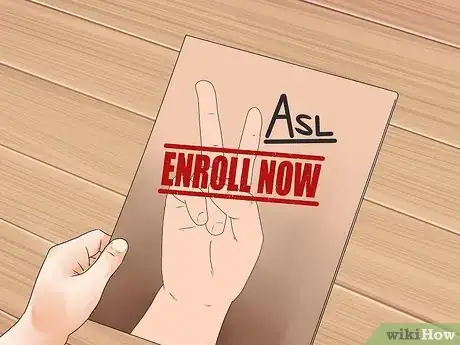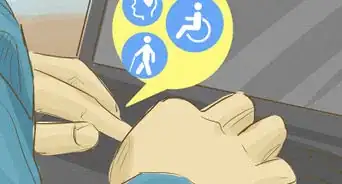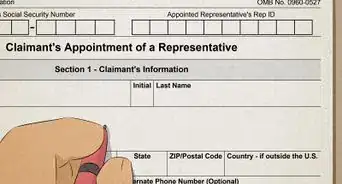This article was co-authored by Meredith Brinster, PhD. Meredith Brinster serves as a Pediatric Developmental Psychologist in the Dell Children’s Developmental and Behavioral Pediatrics Program and as a Clinical Assistant Professor in the Department of Psychiatry and Behavioral Sciences at Dell Medical School of The University of Texas at Austin. With over five years of experience, Dr. Brinster specializes in evaluating children and adolescents with developmental, behavioral, and academic concerns, including autism spectrum disorder, developmental delay, intellectual disability, anxiety, attention problems, and learning disabilities. Her current research focuses on early biomarkers of autism spectrum disorder, as well as improving access to care. Dr. Brinster received her BA in Psychological and Brain Sciences from Johns Hopkins University and her doctorate in Educational Psychology from the University of Texas at Austin. She completed her clinical internship in pediatric and child psychology at the University of Miami Medical School and Mailman Center for Child Development. She is a member of the Society for Research in Child Development (SRCD) and the American Psychological Association (APA).
wikiHow marks an article as reader-approved once it receives enough positive feedback. In this case, 100% of readers who voted found the article helpful, earning it our reader-approved status.
This article has been viewed 40,899 times.
Communicating with someone who has an intellectual disability may be difficult because it is not as easy to know how you are being perceived or understood. A person with an intellectual, or cognitive disability may well have the same kinds of feelings, thoughts, concerns, passions, and struggles that you do. There may be more common ground than you think. If you begin with compassion, a positive attitude, and respect, you'll be off to a great start.
Steps
Being Respectful
-
1Remember that people with intellectual or other disabilities are still people, who still experience the full range of emotions. Show respect and kindness with all people, independent of their abilities. Everyone should be treated with kindness and respect, whether or not a disability or impairment is present. This can be achieved by avoiding name calling and by ensuring that the body language used doesn't come across as defensive (such as crossed arms and legs) as this could come across as feeling uncomfortable around them simply because of their disability. Instead, keep arms and legs unfolded, lean forwards slightly and smile at them. Remember that they had no control over their disability. Treat them like you would treat anyone else.[1]
-
2Be kind and open. People with cognitive and other disabilities can and do form strong interpersonal connections. Despite the challenges, even profoundly impaired individuals, may achieve a profound emotional connection.Advertisement
-
3Speak directly to the person, not to whoever is accompanying them. Most disabled people prefer to be directly addressed, and may be insulted if you talk about them like they aren't in the room. If the person isn't especially talkative, they're more likely to speak up if you talk to them instead of talking over their heads.[2]
- Ask any questions directly to the disabled person.
- Some people with disabilities have different body language. For example, it is not uncommon for autistic people to fidget and appear "zoned out" while they listen closely to someone speaking. Don't assume that someone isn't listening just because of their body language.
-
4Don't change your style of communication unless they ask you to. Many people with disabilities can understand regular speech, and don't want people to speak differently to them. Avoid coming across as condescending, and speak to them normally.[3]
- Speak at your normal speed and volume. If they need you to speak up or slow down, they will tell you.
- Treat them like their real age. Speak to them the same way you'd speak to their same-age peers. For example, a singsong voice and baby talk are not appropriate for addressing disabled teens and adults.
- Match your vocabulary usage to theirs. Many people with disabilities have average vocabularies. However, if the person only speaks with simple words, then you can also speak more plainly.
- Never mimic their disability accent. It won't make them understand you better, but it may make them think that you are trying to make fun of them.
-
5Offer help, without pushing it. It is okay to say "If you ever need any help to make things easier, just ask".[4]
- If they seem to be struggling with something, ask "Do you need help?" or "Would you like me to _____?" Then listen to their answer. Sometimes they'll say no because they want to try it on their own, or they don't really need help.
- If they look puzzled, ask if they're confused about something.
- Don't worry too much about it. While you may not have much experience with disability, they have lived with it for a long time, and they know their own needs pretty well. They can tell you if there is a problem.
-
6Treat them the same way you'd treat any other friend or acquaintance. People with disabilities are ordinary people with hobbies, interests, opinions, and relationships. You don't need to treat them particularly differently than anyone else.[5]
Communicating
-
1Approach the interaction as you would other situations when meeting a new person. Start with a culturally appropriate greeting, which typically consists of acknowledging their presence, introducing yourself, and showing openness to hearing what they have to say. Ask questions, listen, and share your own thoughts and stories. There are many types of intellectual disabilities, so unless you know the specifics of the impairment it is unnecessary to behave any differently than usual.
-
2If the person can hear and speak, you could make conversation. Ask them about themselves. For example: How are you today? What do you like to do? If you ask the right question, their face will light up. It's always a great feeling to connect with someone. Find things you both like.
-
3Consider alternative communication (AC*) methods to communicate as needed. For example, sign language, or simplified signing, hand gestures can be used for children and adults with limited communication skills.[6]
- Many of these are available online.
- For some people, the use of symbols, photographs, or stickers will be easier. These could be presented to show what is happening that day, to illustrate their calendar, to communicate, make choices at mealtime, etc.
-
4When neither the option of using speech or hand gestures is available, eye pointing could be used.[7]
- Use technology to help you. In some cases, electronic devices and specially designed computer software are more suitable options. These can enable a person with a learning disability or developmental disability (intellectual disability) who can't use verbal communication, and can promote their independence.
- You might even make use of smartphone apps to help you interact with ease.
- Never interact with them as you would interact with a toddler. Though their intellectual disability may make you feel like you need to baby them, doing so could make them depressed or even hateful towards you.
- Try not to acknowledge that they have a disability, but don't ignore them if they need help. However, if their disability makes something difficult for them, never just do it for them, unless they ask you to. Instead, give some pointers on how they can do it better.
Warnings
- If they don't want to talk, then don't pressure them. They may feel uncomfortable or even scared just simply communicating with people so don't feel as though you must talk to them to seem nice, respect their wishes, they will probably like you better for it.⧼thumbs_response⧽
- Be yourself with them. They do not need any special treatment. It's only the matter of following a simple rule: be human to everyone.⧼thumbs_response⧽
- Depending on the severity of the disability, the person you're talking with could get frustrated, impatient, distracted, or even angry. Don't take these things personally and stay calm. Just like everyone else in the world, they know when you're tense and it stresses them. Relax and enjoy your conversation. Don't push them away like everyone else does. How would you feel?⧼thumbs_response⧽
- Everyone has something to teach us. Remember that. Pay attention and you will discover that you learn at least as much from them as they do from you.⧼thumbs_response⧽
- Remember that you aren't above that person because you don't have a disability or because you are "smarter" than them. Everyone is equal, whoever they are. Think of the Golden Rule, How would you like to be treated if you were that person?⧼thumbs_response⧽
- If the conversation is struggling or they seem uninterested in your topic of conversation, find a topic they feel passionate about and let them tell you all about it. They'll respect you more for listening and you'll make them feel respected and interesting.⧼thumbs_response⧽
- Give them time to express themselves.Some of them may be stammerers,slow to speak or have trouble connecting words. Be patient and allow them to express themselves at their own pace. They will not only feel appreciated but will also trust you more.⧼thumbs_response⧽
- Do not show any obvious signs of discomfort or impatience. It lowers their self-confidence and trust in you.⧼thumbs_response⧽
References
- ↑ http://www.uiaccess.com/accessucd/interact.html
- ↑ https://www.huffpost.com/entry/disability-etiquette_n_3600181
- ↑ http://www.uiaccess.com/accessucd/interact.html
- ↑ https://www.huffpost.com/entry/disability-etiquette_n_3600181
- ↑ https://www.theguardian.com/global-development-professionals-network/2016/jun/20/we-need-to-stop-treating-people-with-disabilities-as-less-than-human
- ↑ https://www.familyconnect.org/info/multiple-disabilities/communication/alternative-methods-of-communication/135
- ↑ https://action.org.uk/research/cerebral-palsy-helping-severely-disabled-children-who-use-their-eyes-communicate
- ↑ https://www.youtube.com/watch?v=nc9aAY6-ujQ






































































